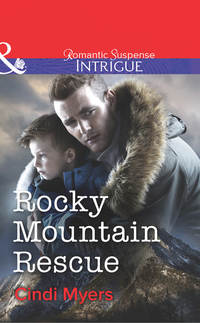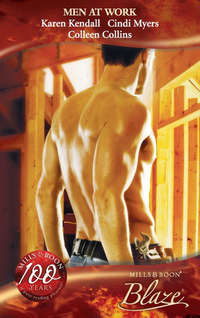
Полная версия
Rocky Mountain Revenge
They sat at the counter and ordered banana-berry smoothies.
“Look what Ty gave me for Valentine’s.” Maggie extended her pinky, showing a gold ring with a row of tiny diamonds.
“It’s beautiful,” Anne said. “Was it a surprise?”
Maggie nodded. “We saw it in the window of a store over in Grand Junction last month and I remarked how I’ve always wanted a pinkie ring. When I saw the ring box on my plate this morning, I squealed loud enough to wake the next door neighbors.” She smiled at the ring. “Did I get lucky or what?”
“You got very lucky.” Anne ignored the pinching pain at her heart. In her party-girl days she’d dismissed love as some fanciful notion from novels and movies. She’d liked being with men, but she hadn’t needed one to make her happy. And the thought of wanting to spend the rest of her life with one had seemed ludicrous.
And then Jacob Westmoreland—she’d known him as Jake West—had walked up to her at one of her father’s clubs and asked her to dance. She’d thought he was handsome and a decent dancer, but then she’d looked into his eyes and her world had shifted. A flood of lust and longing and locked-in connection had rocked her like a tidal wave. Nothing had ever been the same after that.
And now he was back. She didn’t have the strength to go through that heartache again.
“Did you see your picture in the paper? Great promo for the carnival.”
Anne realized Maggie had been talking for several minutes about something. “My picture?”
“In the Telluride paper today. You made the front page.”
She fought back the nervous flutter in her stomach. “I don’t remember anyone taking my picture.”
“You remember that reporter who came around Saturday, when we were working on our carnival booth? He must have taken some candid shots after he talked to us. He got a perfect picture of you framed by the heart cutout in the side of the booth. I think you leaned out to say something to Ty.”
“He should have asked me before publishing it.”
“Oh, come on! I know you don’t like having your picture taken, but it was a great shot, I promise. I’ll save my copy for you. And maybe it will pull in a few more people to our booth at the carnival.”
“That’s great.” Anne managed a weak smile. The first and second grades were teaming up to sell hot chocolate and cider at the Winter Carnival in the town park next weekend, an annual fundraiser for local charities. She wanted to do her part to help, but the thought of her picture circulating in the public made her uneasy. What if someone from her old life saw?
She shrugged off the thought. After all, it was just a small-town paper, a very long way from New York.
“Hey, ladies, how you doing?” A stocky man with broad shoulders and a shaved head came to stand beside their bar stools. Evan McGarrity was rumored to be in his sixties, but he looked two decades younger, and had the energy of a man half his age. “Annie, did your friend find you?” he asked.
Anne went cold. “What friend?”
“There was a guy in here earlier, asking about you. Said he was a friend of yours from New York.”
Aware of Maggie’s eyes on her, Anne kept her expression noncommittal. McGarrity must mean Jake. “What did he look like?”
“Not too tall. About my height, maybe. Good set of shoulders on him. Looked like he might have played football. Dark hair. Expensive suit.”
Jake was tall, with sandy hair and a slim build. This wasn’t Jake. She stood, knocking the half-empty smoothie glass onto its side as she groped blindly for her purse.
“Anne, are you all right?” Maggie asked. “You’ve gone all gray.”
“I’m sorry about the mess.” She stared numbly at the purple liquid spreading across the countertop. “I really have to go.”
She ran to her car, still dressed in her workout clothes, not feeling the icy evening breeze against her bare legs, ignoring the shouts of her friends behind her.
Someone had found her—someone who wasn’t Jake. Someone who might mean her harm.
* * *
ANNE’SFIRSTINSTINCTwas to go to Jake for help. But she had no idea where he was staying. And maybe he’d led them here. She could call Patrick Thompson, the marshal who’d been assigned to her, but he was hours away in Denver. By the time he got here, it might be too late.
She drove home and raced into the house, locking the door behind her. In the bedroom, she dragged her suitcase from the top shelf of the closet and began throwing things in it. She’d wait until after dark, then she’d leave. She’d drive as far as she could toward Denver. It was easier to get lost in the city. She’d ditch the car there, maybe buy a new one or take a bus. She couldn’t travel out of the country. The feds wouldn’t let her get a passport—letting her leave would be too risky, they said.
But she had to leave. The last time she’d seen him, her father had vowed to erase her. That was the word he’d used—erase. As if she were a mistake he needed to blot out. She’d never seen such coldness in his eyes before. His daughter was dead to him already—disposing of her body was of no consequence.
Never mind that she still had plenty of use for that body.
A knock on the door made her freeze. She tried to think. Would the man who was looking for her knock and announce himself?
Yes, she decided, he would. He’d want her to open the door. To let him inside where he could dispose of her quietly, without the neighbors seeing. He’d slip away without anyone noticing and tomorrow, when she didn’t show up at class, someone would find her. Someone else would discover her true identity, and the newspapers and gossip magazines would print the news in bold headlines. Mob King Takes Revenge on Daughter Who Betrayed Him or Mafia Princess Gets Hers.
She waited, but no second knock came. No friendly voice called out in concern. She forced herself to breathe, ragged, metallic-tinged breaths that tasted of terror.
When she could stand the tension no more, she tiptoed into the front room and peered out a gap in the blinds. The street in front of her house was empty. Dark. After another half hour of stillness, she decided no one was there. But maybe they were waiting across the street, waiting for her to open the door.
She pulled on her coat and gloves, then took the loaded pistol from her bedside table and slipped it into the pocket of her coat. When she’d asked for the gun the Marshals had dismissed her, saying she had no need to be armed. She was merely an innocent schoolteacher. Patrick Thompson had assured her the U.S. Marshals Service would provide all the protection she needed. She’d argued with him to no avail.
But three days after her arrival here she’d received a package in the mail. The handgun, ammunition and an unsigned note. I hope you never need this, the note read. But just in case...
One hand on the pistol, she slipped out the back door. The temperature had dropped twenty degrees with the setting sun. The air was brittle with cold, the ground crisp beneath her feet. Staying close to the side of the house, she moved toward the street. She took a step, then waited, listening. She repeated this process all the way down the side of the house, so that twenty minutes passed before she reached the corner. She craned her head around to look toward her front door.
The small porch was empty, the light shining down on the doormat and a rectangle of white that lay on the mat.
Chapter Three
Anne studied the rectangle of white that gleamed on the doormat. It looked like an envelope, and a simple envelope shouldn’t be so ominous. But this one was out of place. The mail carrier delivered letters through the slot in the door. Other people who had messages for her telephoned, or contacted her at school. Did this envelope contain an explosive to injure her, or a poison?
Neither of those things were her father’s style. He believed in personal retribution—not necessarily from him, but from his goons. His representatives, he called them. She remembered overhearing him on the phone with a contractor he suspected of double-crossing him. His words had been so calm, in sharp contrast to the menace in his voice. “I’m sending a couple of my representatives over to discuss this with you.”
When the police found the man, he was floating in the sound, his face gone. Cut off, she’d heard later, while he was still alive.
Shivering with cold and fear, she turned and raced back around the side of the house and through the back door. She ran to the front, opened the door just wide enough to snatch the envelope from the mat, then sat on the sofa, shaking.
She turned the envelope over and read the childish printing. Miss Gardener was rendered in uneven printing. Below that, a more adult hand had penned Happy Valentine’s Day.
Inside the envelope was a crooked heart cut from construction paper, decorated generously with silver glitter and stickers bearing images of cupids and more hearts. The crayoned signature was from one of her students, a wide-eyed little boy who clearly had a bit of a crush on his teacher.
She stared at the words through a blur of tears, hating how the sordidness of her old life had reached out to taint this sweet, innocent gesture. If she ran away, all of that ugliness would follow her, to whatever new town she settled in.
She had friends here in Rogers. A place in the community. She wasn’t ready to give that up, not until she absolutely had to.
* * *
“AREYOUSTAYING in town long, Mr. Westmoreland?”
The desk clerk at Rogers’s only hotel smiled at Jake, all but batting her eyelashes at him. He returned the smile. It never hurt to be friendly with the locals, especially in a place this small. You never knew who might give you the information you needed, or put you in touch with the one contact who could help you break a case. “A few days. I’m not sure, really.” He plucked a brochure advertising Telluride ski area from a rack on the counter. “This is such a beautiful place, I might stay longer than I planned.”
“We’ve got plenty of scenery, that’s for sure,” she said. “Not much excitement, though.”
“I don’t need excitement.” He’d had enough to last a lifetime. As soon as he was done with this last job, he’d stick to crunching numbers for the rest of his life.
“You might stick around for the Winter Carnival next weekend,” the clerk said. “That’s kind of fun.”
“What’s the Winter Carnival?”
“It’s this little festival in City Park. Ice skating, ice sculpture, a broomball tournament. A bonfire. Different groups have booths selling food and hot chocolate and stuff. Real small-town, but a lot of tourists like it.”
“I might have to check it out. Thanks.” The phone rang, and when she turned away to answer it, he took the opportunity to set the brochure aside and leave before she questioned him further.
Outside, the sun was so bright he squinted even behind his sunglasses. The windshield of the car he’d rented in Grand Junction was thick with frost. He turned the heat on full blast and sat in the driver’s seat, debating his next move.
He’d driven by Anne’s house last night, after midnight. Her car had been parked in the driveway, a single light in the back of the house glowing yellow behind the shades. Her bedroom. He’d thought of stopping, but she’d made it clear she wanted nothing to do with him.
Not that he intended to take no for an answer. He understood she was angry with him—upset and hurt by the lies he’d told her. Sooner or later she’d see he’d had to lie to protect them both. The fact that he’d failed so miserably made him more determined than ever to make it up to her.
She was afraid; that was clear. Who wouldn’t be, in her position? Helping him would force her to admit that fear—that weakness. For all the changes in her life and her appearance, she was still a woman who never liked to admit any weakness. Take no prisoners. She could erase the words from her skin, but Jake was certain they were still inscribed on her heart.
Approaching her at her house had been a tactical error. He could see that now. They needed neutral territory. With other people around she wouldn’t be so guarded.
He spent the morning at the library, reading through back issues of the Rogers Reporter, learning what Anne’s life had been like these past nine months. Other than the announcement of her hiring, the new first-grade teacher had stayed out of the spotlight. She was playing by the rules of the Witness Security Program, keeping quiet and fitting in.
At three o’clock he drove to the school, a low-slung group of buildings set one behind the other at the foot of a mesa. The elementary classrooms were in the last building, next to a fenced playground where children in parkas and snowsuits climbed a jungle gym and kicked a soccer ball in the snow.
Jake spotted Anne standing with a shorter woman with curly hair. He waved and strode toward them. Anne stiffened, and the other woman eyed him warily, but he kept a pleasant expression on his face. I come in peace.
Up close, she looked tired, gray smudges under her eyes, her skin pale beneath the makeup, as if she hadn’t slept well. Had thoughts of him kept her awake? Memories of what had happened between them? “Hello, Anne,” he said, stopping in front of her.
“What are you doing here?” She didn’t look angry—more resigned, he decided.
“I was hoping I could take you for a cup of coffee.” He was aware of the other woman staring at him, suspicion in her eyes.
“Is this the man McGarrity was talking about?” the woman asked.
“What man?” Jake asked. “Who’s McGarrity?”
Anne shook her head. “This isn’t him.”
Jake turned to the other woman and offered his hand. “I’m Jake Westmoreland. A friend of Anne’s from New York.”
“Margaret O’Neal.” Her hand brushed his lightly before retreating. “Anne doesn’t look like she wants to see you.”
“It’s been a long time. I wanted to apologize for what happened the last time we met.”
“What happened?” Margaret and Jake were the only ones talking, but at least Anne was listening. She hadn’t walked away.
“Anne left before I could say goodbye.” He spoke to Margaret, but his gaze remained fixed on Anne. She stood with her arms folded, her body angled away from him, her shoulders stiff with tension. “I’ve always regretted that.”
“We don’t have anything to say to each other,” Anne said.
“We have a lot to say to each other. I came two thousand miles to talk to you. Please don’t turn me away now.”
“You can’t say no to a man who says please.” Margaret touched her friend’s shoulder. “A cup of coffee can’t hurt.”
Anne’s eyes telegraphed the word “traitor” to her friend, but she kept silent. She glanced at Jake. “One cup of coffee, then you leave me alone.”
“One cup of coffee.” He wouldn’t leave her, though. He couldn’t.
“Call me,” Margaret said, and left them, smiling to herself.
Anne moved closer to Jake. “Now you’ve done it,” she whispered.
“Done what?”
“Everyone will think you’re the long-lost boyfriend who broke my heart.”
The words were so melodramatic they were almost comical, but he felt the pain behind them. “Is that what happened, Anne?” he asked, his voice as gentle as he could make it.
“No!” Her eyes sparked with anger, the energy in them a jolt to his system, a glimpse of the woman she’d been. “But it’s what people want to think. They think I don’t know about the stories they’ve made up to explain me, but in a town this small, gossip always eventually gets around to everyone. They say I came here all the way from New York to recover from a broken heart. It’s the reason I don’t date anyone now. The reason I won’t talk about my past.”
“It’s a good story,” he said. Maybe part of it was even true, but he didn’t say this. He didn’t want to risk making her angrier.
“That’s the only reason I let them think that. It’s a good story.”
“Have coffee with me and tell me your real story.”
“You already know my real story.”
“Then maybe it’s time I told you mine.”
Her gaze met his, sharp and questioning. “Come with me,” he said. “Listen to what I have to say and then decide how you feel.”
She hesitated, then nodded. “All right.”
She insisted on taking her own car, and led the way to a coffee shop tucked between the library and a church. At this time of day the place was practically deserted, and they settled into a pair of upholstered wing chairs, facing each other across a low table. She cradled her coffee cup in both hands, legs crossed, back straight, elegant even in her schoolteacher’s denim skirt and turtleneck sweater. “Tell me your story, Jake,” she said. “Or should I call you Jacob?”
“I always liked the way Jake sounded when you said it.”
“But Jake West wasn’t your real name.”
“No. But Jake West was close enough to Jacob Westmoreland my handlers thought I wouldn’t get confused in a tense situation.” He shifted, balancing his coffee cup on the arm of the chair. “I wasn’t even supposed to be there at all. I was auditing the accounts at one of your father’s companies, looking for some proof of mob connections. I needed some more information so I made a personal visit. Completely unauthorized, but when I hit it off with the manager there, my bosses saw a way in. They gave me a crash course in undercover work and sent me off to find out what I could. They never expected I’d blow the whole organization open.”
She traced one finger down the side of her cup. Her nails were short and unvarnished, different from the perfect manicure she’d always sported before. “Was seducing me part of the plan?”
“You were never part of the plan,” he said. “I didn’t even know you existed until I saw you at the club that night.”
“You were investigating my father and you didn’t know about me?” She looked scornful.
“I was investigating his business. I didn’t care about his personal life. And I don’t read the society pages.”
“Why did you dance with me that first night?”
“Because I couldn’t not dance with you. The moment I saw you, we might as well have been the only two people in the room.” He leaned toward her. “Don’t tell me you didn’t feel it, too.”
She looked down at her lap, avoiding his gaze, but the blush in her cheeks warmed. “Yes,” she breathed, scarcely louder than a whisper.
Attraction pulled at him now, as strongly as that first night. He’d arrived at the club late—almost midnight. Andy, the manager he’d befriended, who was one of Sam Giardino’s lieutenants, had invited him for drinks. A social call, though Jake suspected this was the night he was going to meet Sam himself.
He and Andy had been standing at the railing overlooking the dance floor of the club in the East Village. A D.J. played techno-pop too loudly and dozens of young people crowded the dance floor. How he’d even spotted her in the confusion was a mystery, but his gaze had zeroed in on her like a laser. She had been dancing with a group of girlfriends, hands in the air, twirling. Laughing with such joy. He’d stared, knowing for the first time what the word “gobsmacked” really meant. He’d never seen someone so full of life and energy. So beautiful and vibrant.
And he’d never wanted anyone so much. Forgetting why he was there and all he might be risking, he’d pushed his way through the crowd until he’d stood in front of her. She’d immediately lowered her arms, and her smile had faded. “Dance with me,” he’d said.
“Why should I?” she’d asked, her voice cool.
“Because I asked nicely.” He’d smiled, coaxing her. “Please.”
He’d expected a few moments’ dancing facing each other, not touching even, but she’d surprised him by moving into his arms. As if the deejay played only for her, the music had switched to a slow number. She’d cuddled up to him like a kitten, and laid her head on his shoulder. “If you want to dance with me, you have to do it properly,” she’d cooed.
And that was how he’d met Sam Giardino, with the don’s daughter wrapped around him, closer than any father likes to see his daughter next to another man. Of course, he hadn’t known she was Giardino’s daughter, but the horrified look on Andy’s face clued him in that something was very wrong. When Elizabeth had stepped back and murmured, “This is my father,” he figured he’d just made the biggest mistake of his career.
But Sam had surprised him. “Elizabeth is a very good judge of character,” he’d declared. “If she likes you, I like you.”
And that was it. With one dance he’d gone from suspicious stranger to practically a member of the family. Weeks went by when he scarcely returned to his own apartment, living at the Giardino penthouse in Manhattan. He ate dinner with the family four nights out of five. He saw Elizabeth every day. And he collected reams of evidence he hoped to use to one day put her father away. His work never felt like a betrayal of her; she was too good for her father. Jake was going to rescue her from that life.
He’d never asked if she wanted rescuing. He could see now that had been a mistake. “I’m sorry things worked out the way they did,” he said.
“It could have been worse. At least we’re both still alive.” She sipped her coffee. “Elizabeth’s gone, but I’m still here.”
“Are you okay with that?”
“Would I rather be living the life of the carefree, wealthy socialite in the most exciting city in the world?” She shook her head. “Even if it was possible, I couldn’t go back to that life—not after you showed me what was really going on, where the money that paid for my designer clothes and nights on the town really came from.”
“I always knew there was more to you than most people gave you credit for.”
“Right. They didn’t give me much credit after my father was arrested. If I wasn’t the poor little rich girl who was biting the hand that fed her, I was the gold-plated harpy who was no better than a criminal herself.”
“I guess I missed all that.”
“How long were you in the hospital?”
“Five weeks. Then I was in a rehab facility for four months after that.”
“Why aren’t you in the witness protection program?” she asked. “If my father knows you’re alive he’ll do everything he can to change that.”
“You thought I was dead—he probably does, too. And even if he doesn’t, I fought too hard to keep my life to turn around and leave it behind. Not that I blame you for making that choice.”
“Maybe it was easier for me because I didn’t want to be who I was anymore. But I still don’t feel safe. Aren’t you afraid?”
“If I let myself think about the danger, I’d be afraid. But I’ve learned to put it out of my mind.”
“To compartmentalize.”
“Is that what it’s called?”
“The marshal who’s assigned to me—a guy named Patrick Thompson—used to talk about it. He told me that’s what I had to learn to do—to lock the fear away in a separate part of my mind and not let it out, like a file I’d sealed.”
“Good advice. Did you take it?”
“I tried. It works sometimes. And then something happens to remind me....” She looked away, her lower lip caught between her teeth.
“Has something happened lately?” he asked. “Something that’s made you afraid again?”
She didn’t answer, and kept her face turned away from him. He leaned forward and took her chin in his hand, gently turning her head until her eyes met his. “Tell me.”
Chapter Four
Jake noticed Anne’s hesitation, as if she was debating whether to trust him. “I’m the only one who knows your story,” he said softly. “The only one who can understand what you’re going through.”
She took a long sip of coffee, then set the cup down and looked him in the eye. “Yesterday, after we talked, I went to my gym. The owner told me a man had been in there asking about me. Was that you?”
He shook his head. “I haven’t been to any gym. And I didn’t ask anyone in Rogers about you. I came straight to your house as soon as I got here.”
The lines around her eyes deepened. “McGarrity—that’s the gym owner—said this guy was dark, and built like a football player.”








